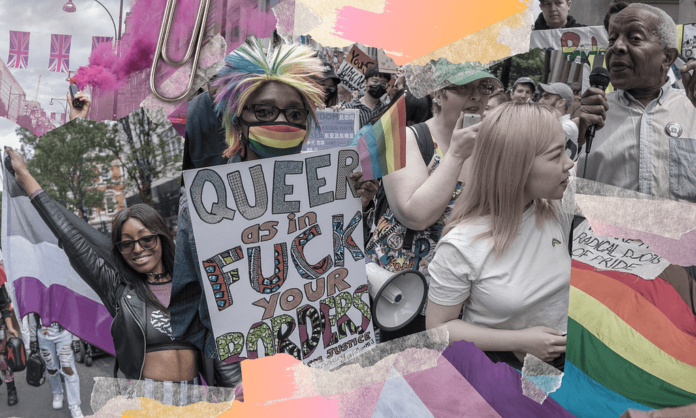
Content warning: this article contains mention of homophobia, transphobia and death.
“Whose streets? Our streets!”
The chants echoed all round a world tinted momentarily pink. As speckled sunbeams shone through smoke-filled canopies and my head filled with the familiar scent of collective action, I looked around at the smiling faces of my friends; my community; my family. My heart filled with love and pride. We were here, now, because we were there, then, 50 years ago. Standing together, walking hand-in-hand, fighting for a better tomorrow.
On Friday 1 July, LGBTQ+ people from all walks of life and our allies joined some of the original members of activist group Gay Liberation Front (GLF) to commemorate 50 years since the first Pride march in the UK. We walked from London’s Trafalgar Square to Hyde Park – chanting and cheering and waving at passers-by – while the veterans bolstered the rear in a vintage shuttle bus.
In 1972, GLF members, and hundreds of others, bravely tackled an identical route. They marched in protest of a socio-political climate that not only systemically marginalised queer people, but actively persecuted them. When the under-21s of the GLF took to the streets, sex between two gay men under the age of 21 was still a criminal offence, and LGBTQ+ people faced daily discrimination and violence in the streets, at work and at home.
“I feel almost as excited today as I did on the first Pride,” original GLF member, Ted Brown, told me. “Although the first Pride also had a certain amount of fear because we didn’t know how people were going to react.”
Despite looming uncertainty, the queer community found not only power in coming together, but also celebration. The GLF were known for organising carnivals and festivals, and using theatre and performance art to raise awareness and encourage change. And when GLF members danced through the streets of London in 1972, they were not only calling for LGBTQ+ liberation, but also celebrating the fact that the queer existence itself is a political act of revolutionary courage.
“Queer existence itself is a political act of revolutionary courage”
While anger is a valid response to decades of oppression, those who fought before us have shown that joy and humour as driving forces can also be transformative. As Rachel Pepper, who was a member of radical organisation Queer Nation in the 1980s, told KQED: “[B]ecause when you are in the midst of a crisis and an epidemic you also have to laugh, and you have to find humour, and you have to love, and you have to live intensely every day, because you don’t know if you’re going to be alive in a year.”
The 1972 march was followed by a mass kiss-in on the plinth under Nelson’s Column, with thousands of LGBTQ+ people sharing moments of intimacy, representing the fact that softness, connection and vulnerability can overcome fear and hate. This act – which was illegal at the time – has sent ripples through the decades and paved the way for half a century of progressive change. Since that day, LGBTQ+ people have gained rights, respect and freedoms of which our elders could not even have dreamed. Today, the majority of the British public are supportive of LGBTQ+ individuals – and we can form families, learn about our history and community at school and live openly as ourselves.
As I gripped on tight to a giant Pride flag on the steps of St Martin-in-the-Fields, waving it in time to queer anthems, laughing with new friends and admiring rainbow sequinned jackets and top-hats, I felt euphoric. The invisible string that connects us to our queer ancestors – its length undefinable – tugged at my heart. Purple letters glimmered in the sunshine upon a bright pink banner: “Out of the closet, into the streets.” And I emerged anew, my identity reaffirmed and my passions reignited. To stand there with some of the same individuals who began this movement – a lit torch that I intend to continue carrying forward, advocating for the rights and safety of all LGBTQ+ people worldwide – was momentous.
“It was a bittersweet celebration, but one rooted in a deep-seated awareness of our strength as a community”
“This is the real Pride; there’s just no two ways about it,” GLF member Dani told me. “Some of the original members were my age 50 years ago. And now I’m here. The weight of that is beautiful. It’s like a weighted blanket; it’s cosy and warm and it’s grounding. I love it.”
The joy I felt didn’t stem from contentment or a delusion that the work here is done. It was a bittersweet celebration, but one rooted in a deep-seated awareness of our strength as a community, and pure exhilaration at the numbers that are willing to be visible and show up for one another. Because the fight isn’t over.
The LGBTQ+ community is facing new challenges that threaten to weaken the foundations on which we’re building a safer future for all. Members of our community continue to experience significant marginalisation, discrimination and violence worldwide – with two people shot and 21 others injured outside a popular gay bar in Oslo last week, on the same day that five LGBTQ+ people were attacked after Dublin Pride.
“I decided to come today and march because the Home Office is relentlessly targeting all asylum seekers, refugees, and immigrants”
Karen, Movement for Justice
Despite vocal campaigning from countless human rights groups, the UK Home Office also continues to put LGBTQ+ people in grave danger by deporting them to countries where being themselves is against the law, or by detaining them in Rwanda, where they may be forced back in the closet or risk facing abuse. Just in June of this year, a gay man was deported to Nigeria, where his life has already been threatened repeatedly. This is all while maintaining a “policy of disbelief”, where officials and judges refuse to accept that a person seeking asylum is truly LGBTQ+ and at risk in their home country.
The UK Government also continues to delay a ban on conversion practices – announcing plans to exclude trans and non-binary people, and allow a consent loophole – despite studies proving the practices to have long-lasting, often fatal, impacts on survivors.
Karen, an organiser with Movement For Justice, told me: “I decided to come today and march because the Home Office is relentlessly targeting all asylum seekers, refugees, and immigrants. They have a rainbow flag on their profile, and companies like Serco and G4S say they promote LGBTQ+ equality, yet they brutalise and torture gay people, and Black and Brown people, all the time. We’re here to express some anger around this.”
Within this context, marching alongside GLF was a reminder that Pride was – and always will be – a protest first, even if rooted in love. Because loving and celebrating ourselves comes with the knowledge that we deserve better. We deserve our lives to be held in higher regard. We deserve to dream, to build and to flourish with the same freedoms and safety afforded to cis-heterosexual members of society. And we deserve liberation from oppressive capitalism and colonialism, rather than the pink-washed rainbow branding currently centred at corporate Pride events. Our ancestors were not handed their rights – they shouted, clawed and fought for every single one – and, together, we can carry on their legacy, until we are all truly free.
Our groundbreaking journalism relies on the crucial support of a community of gal-dem members. We would not be able to continue to hold truth to power in this industry without them, and you can support us from £5 per month – less than a weekly coffee.








